“In this intense one-act duet, Laurie McConnell and John Pierson illustrate why if you are going to put two people in one room, it might as well be them.”
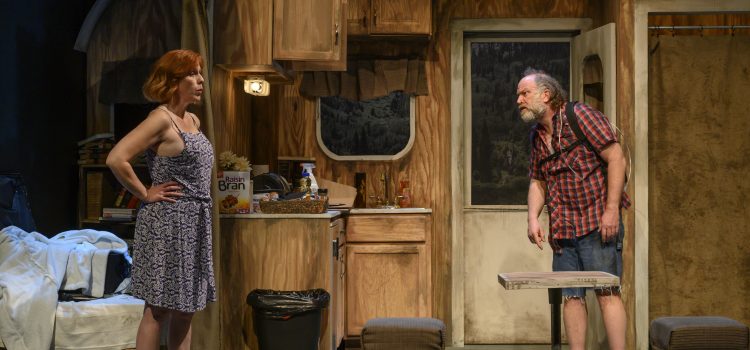

“In this intense one-act duet, Laurie McConnell and John Pierson illustrate why if you are going to put two people in one room, it might as well be them.”
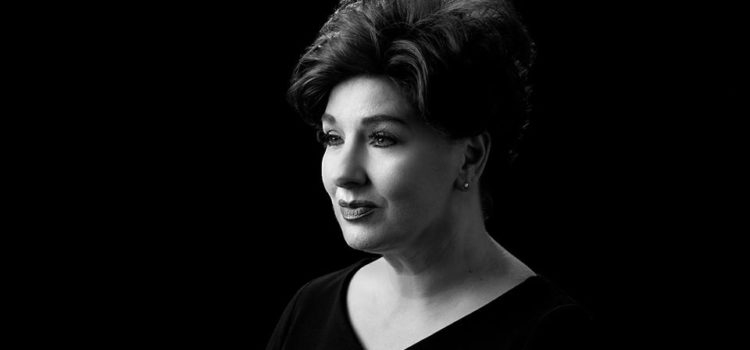
By Lynn Venhaus
Wow. Just a WOW.
Dynamic Debby Lennon has a beautifully trained voice that is spellbinding, and
even better on stage when she is playing a character. She is a terrific storyteller,
which is why she’s often the centerpiece in recent revelatory shows by Max and
Louie Productions.
“Songs for Nobodies” showcases both those talents in a warm, endearing way. On a simple set, wearing a nondescript black dress, Lennon vividly creates a genuine connection between the audience and the stars.
Lennon smoothly guides us through homages of divas Judy Garland, Patsy Cline, Billie Holiday, Edith Piaf and Maria Callas. This is no small feat, given the challenges of their distinctive personas but also the differences in dialects and genres – standards, country, blues, torch ballads and opera.
Lennon delivers each number with customary skill, from Garland’s “Come Rain or Come Shine,” the Harold Arlen classic that was part of her Carnegie Hall concert in 1961, to Callas’ signature aria “Vissi d’arte” from Puccini’s “Tosca” – her 1953 recording is considered the best.
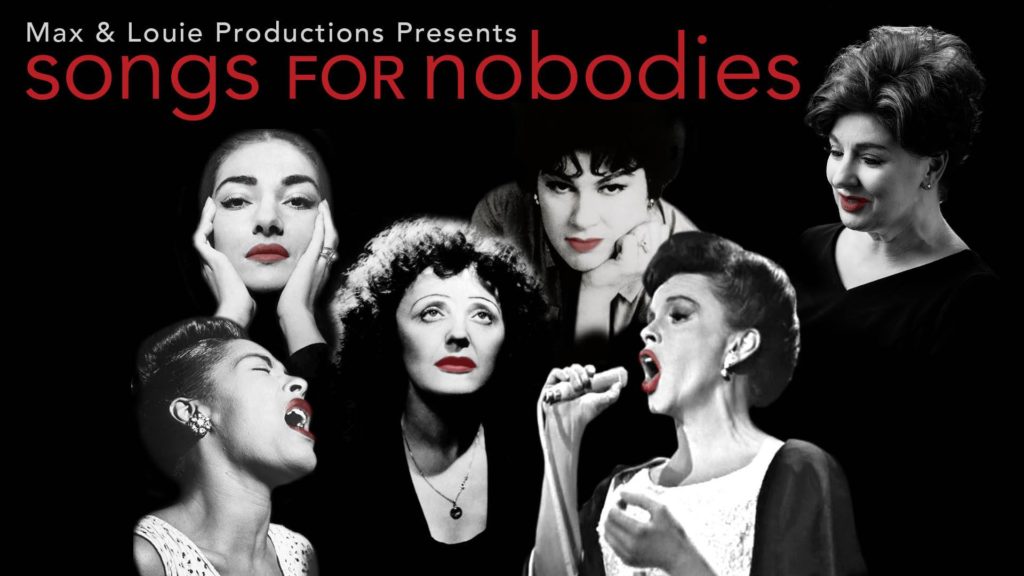
These are not imitations, but rather representations. As Lennon sings these memorable selections of the 20th century in a revealing and heartfelt way, we are transported to other times and places, as this play offers intimate glimpses into ordinary lives with extraordinary results.
Kevin Bowman’s projection design creates a visual frame of reference for each interaction – the famous singer, who after all is human, and the regular people who are their fans. Touched by the music, those fans make a connection that matters in their lives.
Lennon sets each vignette by smartly defining each fictional everyday woman character with humor and instantly likable traits. And why not? They have unexpected life-changing encounters with musical icons of the 20th century, much to their surprise and joy.
These females are the “Nobodies” in the title, but that’s facetious because they are significant human beings. And Lennon brings out the fun in those personalities.
Lennon has sung with the St. Louis Symphony for 33 years and has performed with Opera Theatre of St. Louis, Union Avenue Opera and Winter Opera in St. Louis, in addition to the Muny and other professional regional theater companies.
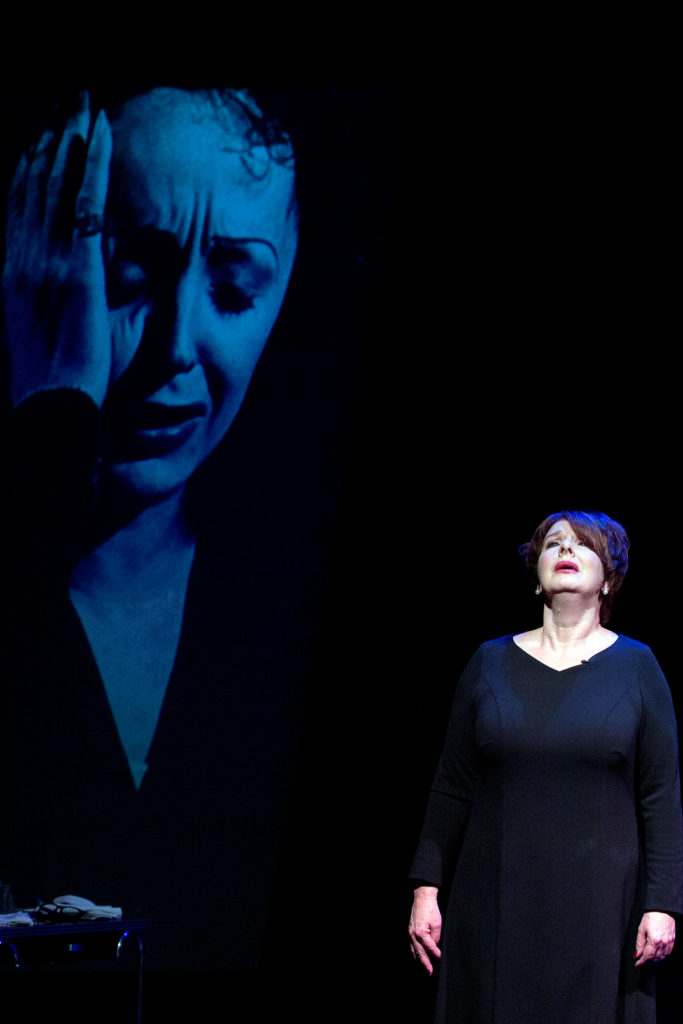
For her unforgettable performances in Max and Louie’s “Grey Gardens” and “Souvenir,” she won two St. Louis Theater Circle Awards. Last year, she appeared in the one-woman show “Love, Linda, The Life of Mrs. Cole Porter.”
Perhaps the most emotional segment is Billie Holiday’s, given her troubles with addiction and the segregated time she lived in, and her bold song “Strange Fruit” is an example of her courage. And “Lady Sings the Blues” was part of her portfolio too.
And French chanteuse Edith Piaf’s rousing “Non, je ne regrette rien” (No, I Don’t Regret Anything) is one of the most familiar songs, and Lennon matches its fervor. She also delivers a robust “L’Accordeoniste.”
Music Director Nicolas Valdez, who also plays piano, superbly conducts the one-woman show. He is joined by Jake Stergos on bass and Keith Bowman on percussion. They are behind a black scrim that is strikingly lit by lighting designer Tony Anselmo, a nice touch.
With wit and charm, Australian playwright Joanna Murray Smith has imagined these memorable women in intriguing scenarios. Beatrice Ethel Appleton, who is stationed in a powder room in a New York hotel; Pearl Avalon, a proud back-up singer; and fashion writer Too Junior Jones thrilled to interview Billie Holliday take place in the U.S. Edie Delamotte, whose section takes historical liberties when talking about Piaf; and Orla McDonough with prima donna Maria Callas.
The most moving is Edie Delamotte’s recollection of her French father’s hardships during World War II.
The play is captivating in the way it presents the personalities, this timeless music and why we care about our relationships with artists.
Director Pamela Hunt also noted the women lived at a time where many a man controlled their lives. This is indeed an interesting aspect.
These gifted singers are bright-light individuals who allowed their brilliance to shine, which is still felt today, and their stories go beyond entertainment.
In their mission statement, Max and Louie refers to “bringing artists and audiences together in a shared experience that illuminates life through joy, wonder, laughter and tears.” Mission accomplished with “Songs for Nobodies.” You could feel the audience’s happiness. That’s a good way to start Max and Louie’s 11th season.
Max and Louie Productions presents “Songs for Nobodies” Jan. 23 – Feb. 2 at the Kranzberg Arts Center. 501 N. Grand. Performances are Thursday at 7:30 p.m., Friday and Saturday at 8 p.m. and Sunday at 3 p.m. A special 2 p.m. matinee on Saturday, Feb. 1, has been added. For more information, visit www.maxandlouie.com
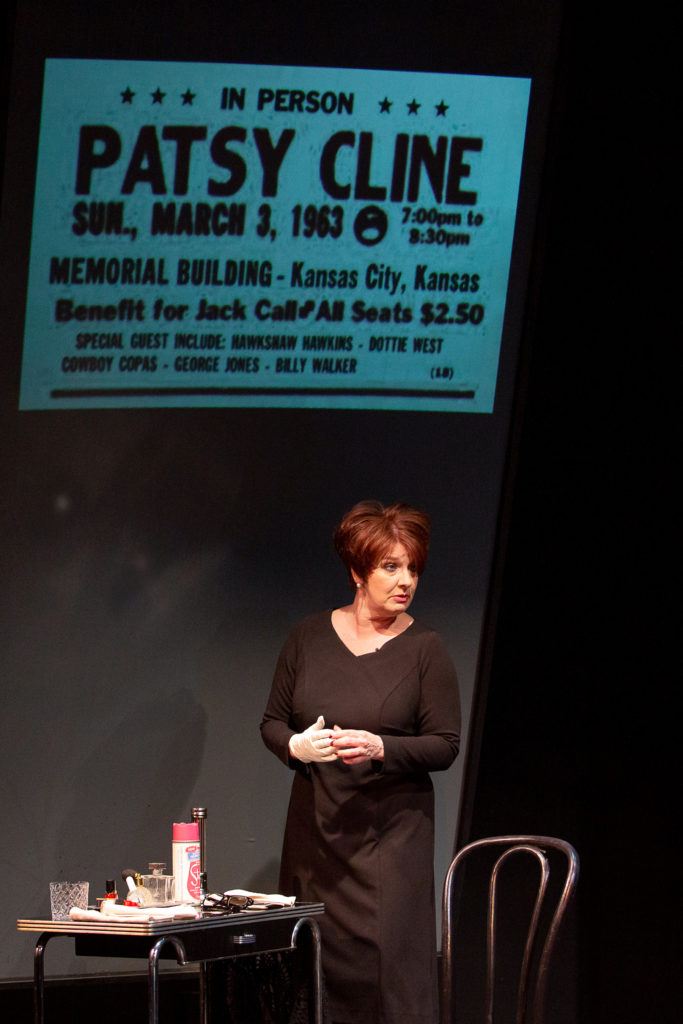

Lynn (Zipfel) Venhaus has had a continuous byline in St. Louis metro region publications since 1978. She writes features and news for Belleville News-Democrat and contributes to St. Louis magazine and other publications.
She is a Rotten Tomatoes-approved film critic, currently reviews films for Webster-Kirkwood Times and KTRS Radio, covers entertainment for PopLifeSTL.com and co-hosts podcast PopLifeSTL.com…Presents.
She is a member of Critics Choice Association, where she serves on the women’s and marketing committees; Alliance of Women Film Journalists; and on the board of the St. Louis Film Critics Association. She is a founding and board member of the St. Louis Theater Circle.
She is retired from teaching journalism/media as an adjunct college instructor.
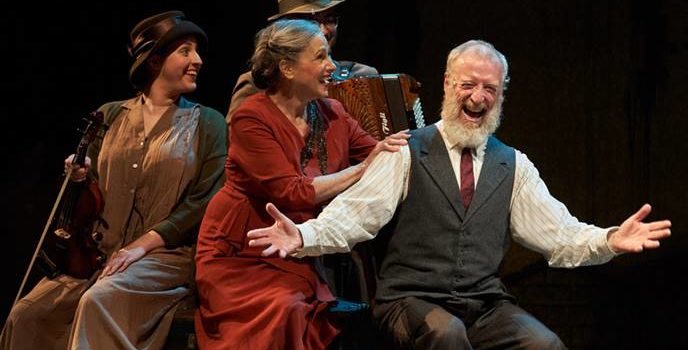
By Andrea BraunContributing WriterIndecent (2017) by Paula Vogel tells the story of a play written by the young Sholem Asch entitled God of Vengeance, first performed in 1907. It is presented as his first play, but it is actually his second; however, this and other departures from fact are described by Vogel as “emotional truth,” rather than absolute historical accuracy.
“Vengeance” ran in Germany in the original Yiddish and
was translated and traveled to several other countries, but then came America. At
first, Asch’s play ran off Broadway and stayed more or less under the radar.
But when it moved uptown to the Apollo and the general public was going to be
courted to buy tickets, as Vogel tells it, the script was changed without
Asch’s knowledge or permission because it contained “unacceptable” material.
Photo by Dan DonovanFor example, a Jewish man makes his living owning a
house of prostitution while he and his wife and “virginal” daughter occupy an
apartment upstairs. This was considered by American Jews to be anti-Semitic,
since the Jewish procurer was a stereotype and would be reinforced in the
general public’s mind. So would the focus on making money any way possible. At
one point, he becomes so furious he destroys a holy Torah, a great sin in
Judaism. But most controversial of all was what became known as “the rain
scene,” in which the daughter kisses one of the prostitutes and they proclaim
their love. To middle-class Americans, this is pornographic filth.
Photo by Dan DonovanAsch is so depressed he can’t leave his house.
Finally, his loving and patient wife talks him into attending a rehearsal, but
to him, the play is dead. The longtime stage manager, Lemml (Lou) also
considers this is a disaster, and it’s something they just cannot understand.
Even stranger, the play is closed down by the police and the actors are
arrested and tried, but the playwright and Lemml are not. Lemml tells Asch that
he is going to take the play back to Poland and translate it back into Yiddish.
He tells Asch, “I am tired of being in a country that laughs at the way I
speak. They say America is free? What [sic] do you know here is free?”
And so he does and his troupe performs the play in
cafes, attics, basements—anywhere that will have them until the Holocaust
decimated the European Jewish community of artists and patrons. Asch himself returns after he’s received an
“invitation” from the House Un-American Activities Committee in the 1950s to
live in London and write prolifically until he literally dies in the saddle, at
his desk, writing. Before he leaves, he meets a young scholar from Yale whom he
tells that he, Asch, “lost six million [who] have left the theater.”
Photo by Dan DonovanThat’s the plot, but now comes the hard part: telling you about the production, which is indescribably beautiful (but I’ll try to describe it anyway). I haven’t listed the names of actors who play the characters because they are all played by seven extraordinary performers who not only tell the story through words but also through song and dance.
They are accompanied on stage by a group of three Klezmer musicians, who play a violin, bass clarinet, and accordion to help express both the sadness and joy the audience and characters are experiencing. I’ve only seen four of the actors listed below (Judi Mann, Tim Schall, John Flack, and Paul Cereghino) but I’ve never witnessed any of them stronger or more sure of the material which makes them turn into other people on a dime.
Photo by Dan Donovan
The evocative music is directed by Ron McGowan, Ellen
Isom choregraphs, Phillip Evans gets credit for sound, and Menachem Szus is the
Yiddish dialect coach.It is a clever conceit to have titles on the rear wall to
help us know where we are, and to have the actors use perfect English to speak
their native languages and accented English when they are speaking a second or
third language. The action spans Warsaw from 1906 to Bridgeport, Connecticut in
the 1950s, and as the program notes, “everywhere in between.”
It’s difficult to write about Indecent without gushing, and I don’t think I managed it. But you
know what? It’s brilliant in every way, so a little gushing is justified. It is
both timely and timeless, and I hope you’ll go see for yourself.
Max and Louie Productions presents “Indecent” at the Grandel Theatre through June 30. Tickets are available through Metrotix and more information is available at www.maxandlouie.com
Photo by Patrick HuberThe
Troupe
TJ
Lancaster: Lemml, The
Stage Manager; Paul Cereghino: The
Ingenue: Avram/Ensemble; Zoe Farmingdale:
The Ingenue: Chana/ Ensemble; John Flack:
The Elder: Otto/Ensemble; Katie Karel: The Middle:
Halina/Ensemble; Judi Mann: The
Elder: Vera/Ensemble; Tim Schall: The
Middle: Mendel/Ensemble
The
Musicians
Alyssa Avery: Nelly Friedman/Violin/Ensemble; Kris Pineda: Moritz Godowsky/Accordion/Ensemble; Jack Theiling: Mayer Balsam/ Clarinet & Mandolin/Ensemble
Photo by Patrick Huber

Lynn (Zipfel) Venhaus has had a continuous byline in St. Louis metro region publications since 1978. She writes features and news for Belleville News-Democrat and contributes to St. Louis magazine and other publications.
She is a Rotten Tomatoes-approved film critic, currently reviews films for Webster-Kirkwood Times and KTRS Radio, covers entertainment for PopLifeSTL.com and co-hosts podcast PopLifeSTL.com…Presents.
She is a member of Critics Choice Association, where she serves on the women’s and marketing committees; Alliance of Women Film Journalists; and on the board of the St. Louis Film Critics Association. She is a founding and board member of the St. Louis Theater Circle.
She is retired from teaching journalism/media as an adjunct college instructor.
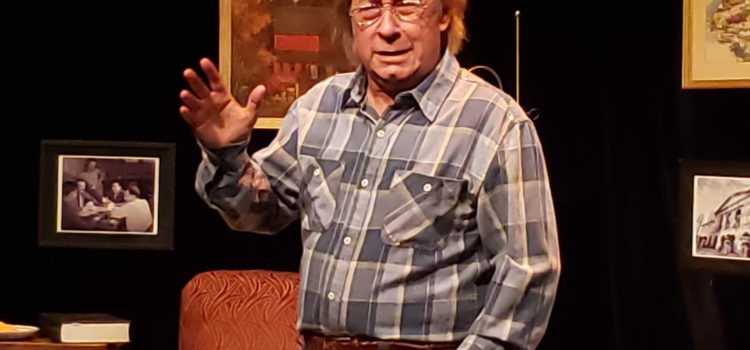
By Lynn Venhaus Managing Editor In The Midnight Company’s charmer of a one-man show, “Charlie Johnson Reads All of Proust” is a good match for Joe Hanrahan’s storytelling skills.
He plays an average Joe, 75, retired from insurance, whose
mundane Midwest life includes Snappy Seniors activities and family to-dos. One
day, Charlie doesn’t realize that a package of cookies as a snack at Starbucks
will lead to a reading adventure. He has what’s called “a Madeleine moment,”
and thus enters the world of French literary legend Marcel Proust, more out of
spite at his snobbish know-it-all daughter-in-law.
The cake-like cookie, sort of in the shape of a seashell,
is associated with Proust’s opus, “In Search of Lost Time,” earlier known as
“Remembrance of Things Past,” which was published between 1913 and 1927, in
seven parts. Dipping the cookie in his tea, the narrator is immediately
transported to childhood memories.
On the surface, Paris during the French Third Republic
couldn’t be more different than contemporary Indiana, but then again, Charlie is
open to the similarities and differences. At that time, France saw the rise of
the middle class and the decline of the aristocracy.
But it is through Proust’s penchant for reflection and
articulation about memory that sparks multiple revelations for Charlie.
And lest not forget perseverance. Many a literary scholar
can’t seem to work their way through all of Proust. The title in itself is a
testament to fortitude. And in modern library terms, the seven volumes amount
to 4,300 pages – and 2,000 characters.
Charlie proves to be quite an interesting character, a
meaty role designed for Hanrahan’s gifts. And he’s well-suited to bring out the
humor in playwright Amy Crider’s work, which pops with personality. She is an
astute observer of human nature, visually conjuring an assortment of regular
folks you know you know.
The Kranzberg black box is simply outfitted with a
comfortable easy chair, a well-worn living room space that provides an
immediate sense of place. Chuck Winning’s set design takes you to an everyman
nook, with photographs and artwork that mean something, a statement on the
artist’s role in society and understanding an artist’s life as influence. Tony
Anselmo’s lighting design also reflects on the lived-in quality.
Director Sarah Lynne Holt emphasizes Charlie’s dignity and
intelligence, while Hanrahan’s monologue delivery brings out the absurdities in
life we can all relate to, no matter our circumstances.
This solo sojourn is an insightful piece, a fanfare for the common man that the Midnight Company fluidly interpreted as a guy with something to say.
The Midnight Company presents “Charlie Johnson Reads All of Proust” Thursday through Saturday at 8 p.m., May 30 to June 15, at the Kranzberg Arts Center, 501 N. Grand. For more information, visit www.midnightcompany.com

Lynn (Zipfel) Venhaus has had a continuous byline in St. Louis metro region publications since 1978. She writes features and news for Belleville News-Democrat and contributes to St. Louis magazine and other publications.
She is a Rotten Tomatoes-approved film critic, currently reviews films for Webster-Kirkwood Times and KTRS Radio, covers entertainment for PopLifeSTL.com and co-hosts podcast PopLifeSTL.com…Presents.
She is a member of Critics Choice Association, where she serves on the women’s and marketing committees; Alliance of Women Film Journalists; and on the board of the St. Louis Film Critics Association. She is a founding and board member of the St. Louis Theater Circle.
She is retired from teaching journalism/media as an adjunct college instructor.
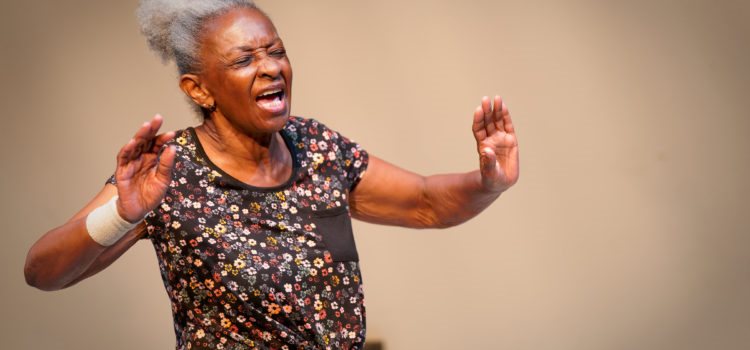
By Lynn Venhaus
Managing Editor
Linda Kennedy is a whirling dervish as the title character in “Chef,” pacing, pouncing, pouting and preening in a sparse jail cell.
She remains animated through the entire 80 minutes, keeping our attention as she talks of her complicated life. And when she discusses food, she practically swoons.
Through her customary skill, Kennedy creates vivid depictions of the scenario she weaves in Upstream Theater’s season opener.
What kind of journey did she have, from haute cuisine to prison cafeteria kitchen? Heartbreak, humor, and life experiences tumble out of this tiny woman.
Life isn’t so black-and-white, and Kennedy will lead us through her painful memories, but there is joy as well. She will recall people she loved, and those she didn’t. Those who betrayed, and those who let her down.
Defiant, she questions our attitudes about violence, love and convicted inmates, people not so different from us who serve time.
UK/Egyptian Writer Sabrina Mahfouz has crafted a play with the ingredients that director Marianne de Pury celebrates in the art form: “laughs, tears, curse words, beautiful language, silly giggles, weird sounds, spurts of anger, love, resentment, war, peace, unexpected and long-forgotten memories – and sometimes even a message to the world,” she writes in her director’s notes.
De Pury, who came to St. Louis from Europe to direct this U.S. premiere, makes sure Kennedy’s energy engages.
Kristin Cassidy has created a claustrophobic feeling in that small cell, while Tony Anselmo’s lighting design pinpoints the reality of the chef’s present situations.
Jim Blanton’s sound design provides the cacophony of a correctional center while Laura Hanson’s costume design jolts our complacency with a bloody chef’s white uniform coat.
Kennedy makes us think and feel, drawing us in as bystanders – it’s impossible not to be moved by this gripping material.
“Chef” is presented at Upstream Theater Friday through Sunday, Sept. 28-30, Oct. 5-7 and Oct. 12-14, at the Kranzberg Arts Center (Grand and Olive), with all shows at 8 p.m. except for the first two Sundays at 7 p.m. and the last Sunday at 2 p.m. For the box office hotline, call 314-669-6382.
Photo by ProPhotoStl.com

Lynn (Zipfel) Venhaus has had a continuous byline in St. Louis metro region publications since 1978. She writes features and news for Belleville News-Democrat and contributes to St. Louis magazine and other publications.
She is a Rotten Tomatoes-approved film critic, currently reviews films for Webster-Kirkwood Times and KTRS Radio, covers entertainment for PopLifeSTL.com and co-hosts podcast PopLifeSTL.com…Presents.
She is a member of Critics Choice Association, where she serves on the women’s and marketing committees; Alliance of Women Film Journalists; and on the board of the St. Louis Film Critics Association. She is a founding and board member of the St. Louis Theater Circle.
She is retired from teaching journalism/media as an adjunct college instructor.